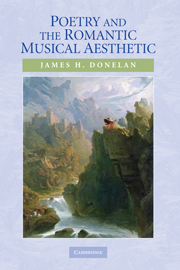Book contents
- Frontmatter
- Contents
- List of Musical Examples
- Acknowledgments
- Preface: The Sound and the Spirit
- Chapter 1 Self-Consciousness and Music in the Late Enlightenment
- Chapter 2 Hölderlin's Deutscher Gesang and the Music of Poetic Self-Consciousness
- Chapter 3 Hegel's Aesthetic Theory: Self-Consciousness and Musical Material
- Chapter 4 Nature, Music, and the Imagination in Wordsworth's Poetry
- Chapter 5 Beethoven and Musical Self-Consciousness
- Chapter 6 The Persistence of Sound
- Notes
- Bibliography
- Index
Preface: The Sound and the Spirit
Published online by Cambridge University Press: 22 September 2009
- Frontmatter
- Contents
- List of Musical Examples
- Acknowledgments
- Preface: The Sound and the Spirit
- Chapter 1 Self-Consciousness and Music in the Late Enlightenment
- Chapter 2 Hölderlin's Deutscher Gesang and the Music of Poetic Self-Consciousness
- Chapter 3 Hegel's Aesthetic Theory: Self-Consciousness and Musical Material
- Chapter 4 Nature, Music, and the Imagination in Wordsworth's Poetry
- Chapter 5 Beethoven and Musical Self-Consciousness
- Chapter 6 The Persistence of Sound
- Notes
- Bibliography
- Index
Summary
I hear the motions of the spirit and the sound
Of what is secret becomes, for me, a voice
That is my own voice speaking in my ear.
– Wallace Stevens, “Chocorua to its Neighbor”These lines, although written by a twentieth-century American, nevertheless provide an eloquent summary of what I intend to examine in European poetry, philosophy, and music between 1798 and 1830. Although many critics have studied vision and the visionary in Romantic poetry, relatively few have confronted the related issues of sound, voice, and music, and even fewer have looked into corresponding moments in musical aesthetics and composition. I attempt to answer several questions about these concepts and practices in all three fields and relate these answers to each other. How does musical sound become the articulate voice of the self? How does natural sound become music? How can music represent self-consciousness? I argue that Hölderlin and Wordsworth, despite their obvious differences, follow a similar path of self-constitution through a musical conception of poetic sound. Furthermore, I maintain that Hegel and Beethoven, although working in radically different fields, nevertheless establish music and self-consciousness as mutually positing, reciprocal dialectical structures. In other words, at the core of early Romanticism lies a structure – the dialectic of Idealist self-consciousness – and a metaphor – the self-sustaining aesthetic of absolute music – that mirror and support each other, often in ways difficult to discover.
- Type
- Chapter
- Information
- Poetry and the Romantic Musical Aesthetic , pp. xi - xviPublisher: Cambridge University PressPrint publication year: 2008



